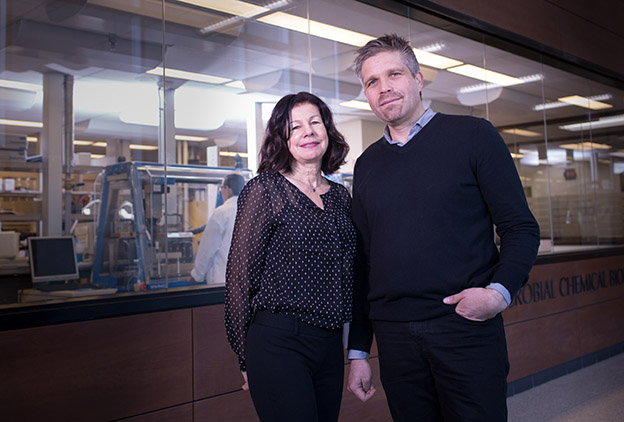Team of experts to investigate death of Nobel winner Pablo Neruda

Debi Poinar, research associate in the Department of Anthropology, and Hendrik Poinar, director of McMaster’s Ancient DNA Centre and a professor in the Department of Anthropology and the Michael G. DeGroote Institute for Infectious Disease Research.
An international team of genomics experts and forensic investigators will conduct a scientific and historical analysis of the remains of Chilean poet Pablo Neruda, the Nobel Prize winner who mysteriously died in 1973, just days after the bloody coup by General Augusto Pinochet.
In 2011, the Chilean courts launched an inquest into Neruda’s death. The Chilean government supported the inquest in 2015 and has recently acknowledged that it was “clearly possible and highly probable” that third parties participated in Neruda’s death, while also making it explicitly clear that the final conclusions could ultimately only be established by the courts.
Neruda’s remains were exhumed in 2013 in an attempt to determine the cause of death. A new panel of scientific experts that convened in Santiago, Chile in October of last year, will focus on identifying pathogens, including Staphylococcus aureus, which was found in the bone remains of Neruda in 2014 using protein-based methods.
Two highly specialized labs, located at McMaster’s Ancient DNA Centre and the Department of Forensic Medicine at the University of Copenhagen, will analyze bone and teeth remains. Phase one of the work will search for traces of microbial DNA to test for the presence of possible pathogenic bacteria.
“We are looking for the presence of specific or pathogenic bacteria that may have ultimately been responsible for Mr. Neruda’s death, in the form of bacteremia. Anything we find will be teased out and analyzed on a genomic scale,” says evolutionary geneticist Hendrik Poinar, who is director of McMaster’s Ancient DNA Centre and a professor in the Department of Anthropology and the Michael G. DeGroote Institute for Infectious Disease Research at McMaster.
Researchers will use sophisticated techniques to extract, purify and enrich fragments of the bacterial DNA, which they hope will yield precious genomic data and perhaps answer unresolved questions regarding its role, if any, in the poet’s death. The work will take months to identify any pathogen, then sequence and interpret its genome.
“The search for the truth of the death of the poet, Pablo Neruda, is a forensic challenge. We hope that the work of the Chilean Human Rights Program and the scientists will contribute to the reconciliation between the various groups in Chile,” says forensic geneticist Niels Morling, director of the Department of Forensic Medicine, Faculty of Health and Medical Sciences, University of Copenhagen, Denmark, and professor of forensic genetics at the universities in Copenhagen, Denmark and in Tromsoe, Norway.
A beloved poet and national hero, Neruda was a Communist, diplomat and close personal friend of Chile’s president Salvador Allende, who committed suicide in La Moneda, the presidential palace on September 11, 1973, the first day of the coup.
Neruda had planned to go into exile in Mexico after the coup, and while in care at the Santa Maria Clinic in Santiago, died under suspicious conditions, just one day before his planned departure.
“Science is a means to reach a possible conclusion in the suspected murder of Pablo Neruda, and although it may play a very significant role in resolving this case, it is the further recognition of human rights abuses committed under the Pinochet regime that is essential. We are hopeful that this connection between science and history will help bring transparency to the thousands of people affected by this very painful past,” says Debi Poinar, research associate in the Department of Anthropology at McMaster.
“We are hopeful for experimental results that speak clearly to the truth about Neruda’s death. Regardless, the cause of human rights will be served best by describing the results clearly even if they are not definitive,” says Charles Brenner, professor of forensic math and genetics at the University of California, Berkeley.
Questions have lingered over the cause of Neruda’s death for more than four decades. In 2013, a panel of toxicology experts analyzed biological samples from Neruda’s remains to determine if he was poisoned, but the results were inconclusive.
Other members of the panel include George Sensabaugh, professor of forensic genetics who works on Staphylococcus, forensic geneticist Cristián Orrego Benavente, from the Human Rights Center at the University of California, Berkeley, Marie-Louise Kampmann from the University of Copenhagen, Luis Soto and Gloria Ramirez from the Chilean Hospital for Thoracic Diseases, as well as scientists from the Medical School at the Universidad de Chile, the Universidad de Murcia and the Universidad del País Vasco in Spain.
The international team was convened by Magistrate Mario Carroza in Chile with the support of the Human Rights Program of the Chilean Executive branch in the Ministry of the Interior.
This research story was also featured on the front page in the Globe and Mail newspaper along with a two-page spread inside. The story can be viewed on the Globe and Mail website.



